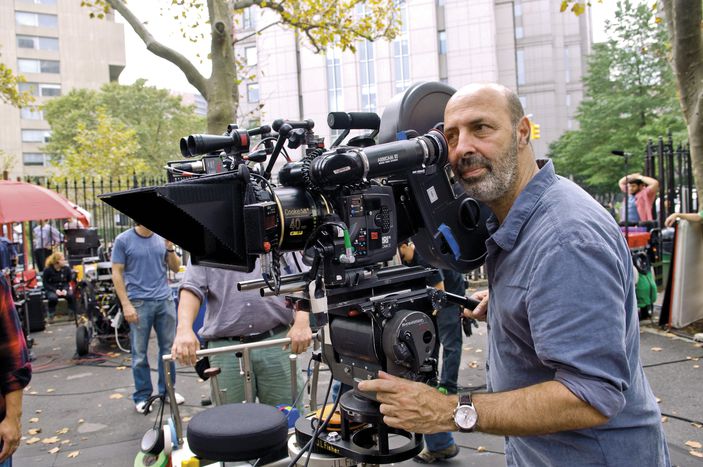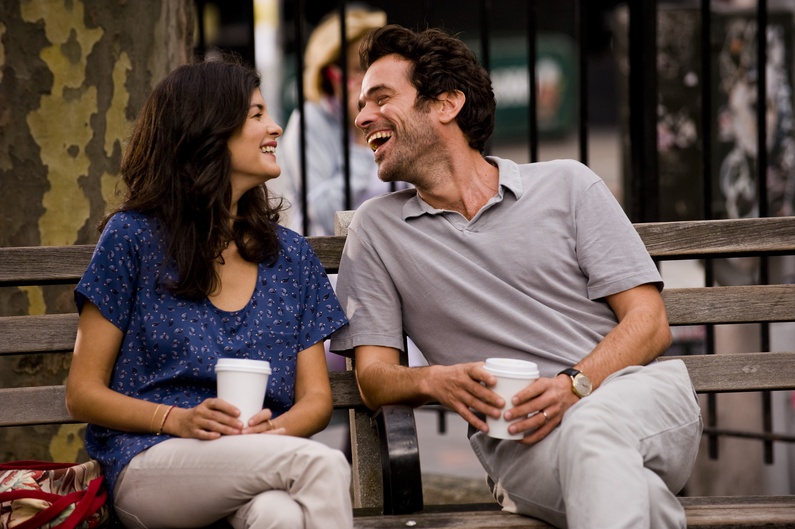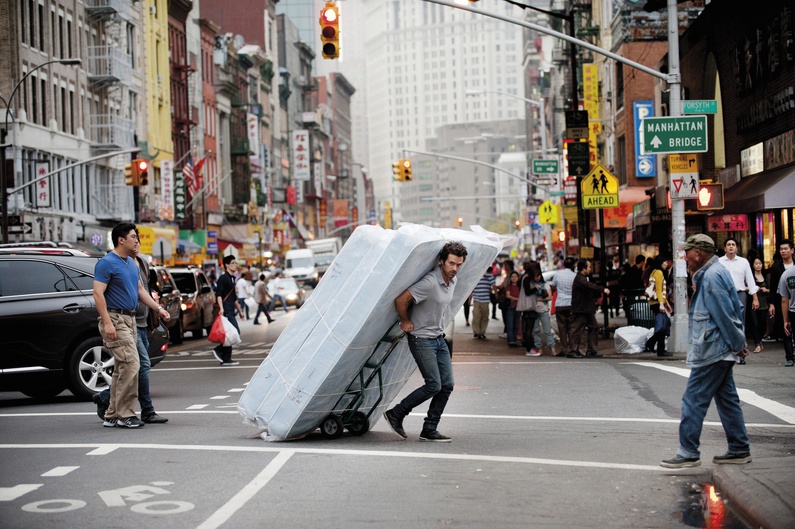
Cédric Klapisch: "My story tells the tale of globalisation"
Published on
Translation by:
Garen Gent-RandallCédric Klapisch would certainly be the last true contemporary European filmmaker. For the release of Chinese Puzzle, his latest (and most skilful) sequel to Erasmus comedy Auberge espagnole, the French director met cafébabel at the Hôtel Fouquet's on the Champs-Elysées to talk about Rubik's Cubes, age, and (what else?) Europe.
cafébabel: So what exactly is a Chinese puzzle?
Cédric Klapisch: We have an expression in France: casse-tête chinois [the film's title in French - Ed.]. It's like a puzzle, a brain-teaser. It's something that's difficult to work out, a sort of complicated Rubik's Cube.
cafébabel: The title came to you quickly, just after you'd made Russian Dolls. What exactly does it mean to you?
Cédric Klapisch: It means that life isn't getting any simpler. And I mean life with a capital L. That thing where life tends to infinity, to more and more sophisticated and complex things. I don't think it's a problem, I think it's good. We are able to develop because life is becoming more complex. In the back of my mind, I felt - and it turned out to be true - that in Xavier's (Romain Duris) life, this Chinese puzzle is also what pushed him towards finding a solution. A force which allowed him to attain a certain fullness.
"Why do these 40-year-olds think they're old?"
cafébabel: But this third film took you the longest time to write. Why?
Cédric Klapisch: Because I knew the characters, I thought it would be easy. But as the storyline unravelled, I found that at times, it was a bit disappointing. So, I needed to think about it, go deeper, spend some time trying to surprise people. And to surprise myself.
cafébabel: Everyone was waiting for this film. Did that put pressure on you?
Cédric Klapisch: Yes. And it also made the writing difficult. I felt this need, not to do better, but not to do worse. It turned out to be quite nerve-wracking, for quite a long time.
 cafébabel: From the start of this third film, it feels like the characters are exactly where you last saw them, but in fact it's been ten years since Russian Dolls. How did you write the characters?
cafébabel: From the start of this third film, it feels like the characters are exactly where you last saw them, but in fact it's been ten years since Russian Dolls. How did you write the characters?
Cédric Klapisch: I had to go back over what we knew about Xavier. At the same time, I had to make him change. It was hard for me and for Romain. Now he's 40, and he can't be as clumsy, as immature as before. I wanted to show how he's grown up, how he's become more of a man.
cafébabel: But it still seems that Xavier is chaotic, that he's always running to catch up with something.
Cédric Klapisch: I think he's taking on his responsibilities, but he doesn't do it in the conventional way. He could stay in Paris, without his kids. But he goes off and lives a life he doesn't necessarily want to live. Of course he maintains a childish side, especially when he talks about being old. When my dad came to see the film, he said, "Why do these 40-year-olds think they're old?" And he's right - when you're 40, you're not old. Our society idolises youth to such an extent that, when someone turns 40, we think life is over. But it's the opposite, you're starting a new life. So I think the film talks about that a lot, the sort of second life that starts when you get to the middle, you look back and take stock.
"Deal with your own shit"
 cafébabel: This second life takes place outside of the Old Continent. Europe's looking old in your film.
cafébabel: This second life takes place outside of the Old Continent. Europe's looking old in your film.
Cédric Klapisch: Well, it's looking bad. Especially in terms of the image of the Europe I filmed at the time of l'Auberge Espagnole, where there was a sort of hope, where people said "we're all brothers." We're not like that now.
cafébabel: So what's happened in 10 years?
Cédric Klapisch: Mistakes have been made. Like the rivalry between Spaniards and Catalans, between Greeks and Germans, between rich countries and poor countries, now it's "deal with your own shit." It's clear that the 2008 crisis slowed down European expansion, stopped it, even. At the same time, I get the feeling that Europe is resisting. Maybe I'm overly optimistic, but you can see a certain solidarity through the crisis. Afterwards, in the third film I didn't want to talk about Europe, but about globalisation. Lastly, the trilogy tells the story of globalisation which we've witnessed over the last 20 years.
cafébabel: By sometimes presenting Xavier as a member of the old Europe, doesn't the film discuss the different approaches America and Europe have taken to globalisation?
Cédric Klapisch: Yes, it does, I see that. People go off to America and Canada, countries which have probably suffered the crisis worse than we have. But they deal with it better there, it's incredible. There's this concept of enthusiasm, whereas in Europe, we drag our depression along with us. We're depressed.
cafébabel: One year ago, you wrote a column on Erasmus. Is it something you still like to advertise?
Cédric Klapisch: Yes, because I think it's the best thing that has ever happened to Europe. What is irrefutable is that the Erasmus programme has been a total success. I've spoken with the people who created it in Brussels. For ten years, they tried to sell the idea despite people saying it would lead to a brain drain. And in the end, it was the opposite - we witnessed the affirmation of a European identity.
cafébabel: We grew up with your films. How do you manage to capture the essence of the times?
Cédric Klapisch: I look at things around me. L'Auberge Espagnole changed some people's lives because they saw my film. And I'm proud of that.
Translated from Cédric Klapisch : « Ma trilogie raconte l’histoire de la mondialisation »



